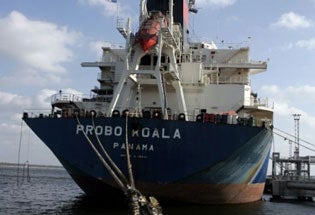Trafigura fined over toxic waste

Your support helps us to tell the story
From reproductive rights to climate change to Big Tech, The Independent is on the ground when the story is developing. Whether it's investigating the financials of Elon Musk's pro-Trump PAC or producing our latest documentary, 'The A Word', which shines a light on the American women fighting for reproductive rights, we know how important it is to parse out the facts from the messaging.
At such a critical moment in US history, we need reporters on the ground. Your donation allows us to keep sending journalists to speak to both sides of the story.
The Independent is trusted by Americans across the entire political spectrum. And unlike many other quality news outlets, we choose not to lock Americans out of our reporting and analysis with paywalls. We believe quality journalism should be available to everyone, paid for by those who can afford it.
Your support makes all the difference.Oil trading company Trafigura was today fined a million euros (£840,000) for exporting hazardous waste to Ivory Coast and hiding the cargo's dangerous nature when it was unloaded from a ship in Amsterdam.
Prosecutors had asked for a fine of two million euros.
Amsterdam District Court judge Frans Bauduin also convicted a Trafigura employee for his role in the 2006 scandal and the Ukranian captain of the Probo Koala ship that carried the waste.
Toxic waste made thousands ill in the Ivory Coast capital, Abidjan, in August 2006, although Trafigura insists the waste from the Probo Koala could not have caused serious illness.
The verdict is the first time Trafigura has been convicted in the scandal.
The company, based in Lucerne, Switzerland, has consistently denied any wrongdoing in the case. But it paid 157 million euros to Ivory Coast to help clean up the waste and another 40 million euros to victims in a British settlement this year.
Under the British settlement, lawyers agreed the waste could not have caused deaths but could have caused short-term, low-level illness.
At the criminal trial in Amsterdam last month, prosecutors accused Trafigura of putting profits ahead of safety by hiding hazardous waste in a ship that docked in Amsterdam in 2006 and then exporting it illegally. The waste was later dumped in Ivory Coast in what became a major environmental scandal.
Presiding Judge Frans Bauduin said Trafigura chose to dump the waste cheaply in Ivory Coast "for commercial reasons."
The company employed in Abidjan charged 35 dollars per ton of waste, while in Amsterdam it would have cost almost 1,000 dollars per ton, the court said.
"Under those circumstances, Trafigura - which by that time knew of the exact composition (of the waste) - should never have agreed to its processing at such a price," the judge said.
The company said it will study the verdicts "with a view to appeal."
"While Trafigura is pleased to have been acquitted of the charge of forgery it is disappointed by the judges' ruling on the other two, which it believes to be incorrect," it said in a statement.
Trafigura lawyer Michael Wladimiroff said that the conviction for exporting waste to Ivory Coast was based on the court's decision to apply an incorrect waste management treaty.
Trafigura argued that the Marine Pollution Treaty applied and that under that treaty it was legal to export the waste to Ivory Coast. The court decided a different treaty applied, under which sending the waste to Abidjan was illegal.
In Ivory Coast, where almost 30,000 victims and their families received 1,500 dollars compensation in March, the ruling was greeted as a moral victory because Trafigura has never admitted to any wrongdoing.
"Finally, Trafigura has been called out in a court of law," said Eliance Kouassi, president of the National Federation of Toxic Waste Victims in Ivory Coast. "It's a real victory for us," he said.
Amsterdam District Court also convicted Trafigura employee Naeem Ahmed for leading the effort to dump the waste "while its dangerous nature was concealed."
He was fined 25,000 euros and given a six-month suspended sentence.
"Trafigura continues to maintain that Naeem did nothing wrong and will provide him and his legal team with whatever legal assistance they may require," the company said.
The Ukrainian captain of the Probo Koala ship that carried the waste, Sergiy Chertov, also was convicted and sentenced to a five-month suspended prison term for the same offence and forgery, for concealing the nature of the waste in a written declaration.
The ship had begun unloading waste "slops" from one of its tanks in Amsterdam, but then had them pumped back aboard after a dispute over processing costs.
An investigation into the composition of the slops was still under way when the ship was granted permission to leave, which prosecutors say violated Dutch law.
Amsterdam Port Services and its director Evert Uittenbosch were cleared of charges of "leaving dangerous waste in the hands of someone not qualified to process it."
Judges also dismissed charges against Amsterdam municipality, saying it was immune from prosecution as it was exercising its executive functions.
Join our commenting forum
Join thought-provoking conversations, follow other Independent readers and see their replies
Comments